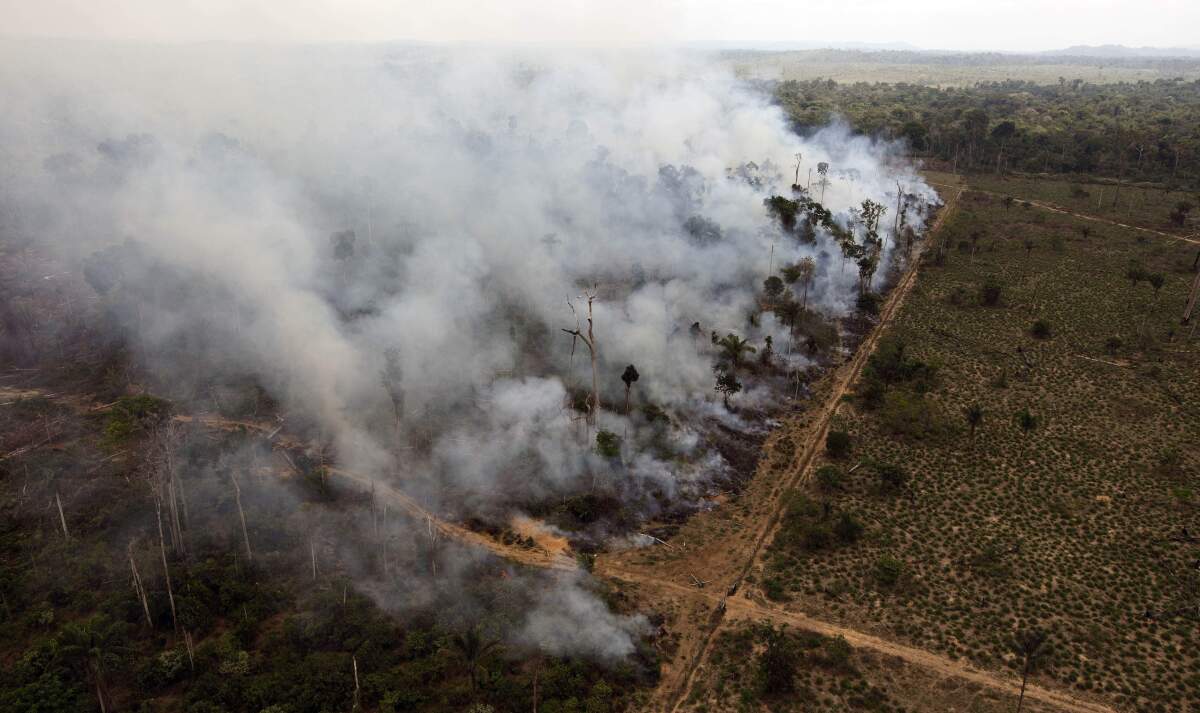Opinion: How a California climate win could end up destroying rainforests — and what to do about it

Half the diesel fuel in California is made not from unsustainable petroleum but from renewable biomass such as waste and plant oils. Soon all our diesel will be biofuels. This is particularly good for the environment if the fuel is made from wastes and residues, but it’s much less so if it’s made from crops that use energy and land but don’t produce food.
Unfortunately, a proposed amendment to California’s Low Carbon Fuel Standard threatens to put the state, the country and the world on a course toward relying more heavily on diesel produced from crops, ensuring more widespread destruction of rainforests and diversion of farmland from food to energy production.
California pioneered the standard to support the development and use of lower-carbon fuels for transportation. It effectively encourages oil companies to subsidize low-carbon fuels and electric vehicles without bankrupting them, and the only costs to taxpayers are administrative. This innovative policy has been replicated in Oregon, Washington and Canada, while other states and Congress are considering comparable measures.
The fuel standard incentivizes the use of renewable diesel made from oil waste and crops, a major success of the policy. Renewable diesel can be used in virtually any diesel engine, reducing greenhouse gas emissions by 70% or more when it’s made from waste oils.
The environmental benefits are much less substantial, however, when the fuel is made from crop-based oils such as soybean or canola. That’s because those crops require energy, fertilizer and land, among other environmental consequences.
Renewable diesel offers such a compelling business opportunity to oil companies that two Bay Area refineries are being converted to produce it, possibly by the end of this year. California-inspired renewable diesel is booming across the country.
As the industry grows, however, it’s having some unintended consequences. Until recently, most renewable diesel was made from waste cooking oil, rendered beef fat and corn-ethanol byproducts. But now those domestic sources of waste oil are largely tapped out. Indeed, the U.S. has to import not only waste-based fuels but also the wastes and residues themselves to supply our processors.
That means more and more renewable diesel is likely to come from oil produced from soybeans and other food crops. We know from experience that increasing demand for plant-based oils — whether for food, animal feed or biofuels — leads to more slashing and burning of tropical rainforests in Southeast Asia and South America to expand palm and soy oil production. This deforestation releases mass quantities of greenhouse gases by burning trees that have sequestered carbon over centuries. It also harms watersheds, disrupts Indigenous communities and causes a raft of other social and environmental problems.
If what happened in California stayed in California, we wouldn’t be so concerned. Global vegetable oil producers probably could replace California’s remaining fossil-fuel-based diesel without much additional harm.
But other jurisdictions that have adopted or are considering policies like California’s are watching the state carefully. And the Treasury Department, European Union and global airlines are about to embrace plant oils as a substitute for the fossil fuels used in aviation. What California decides about renewable diesel will therefore have far-reaching effects.
The California Air Resources Board is updating the Low Carbon Fuel Standard this year to raise its targets and make other adjustments, including expanding its scope to include jet planes operating within the state. It is not, however, proposing to rein in the use of crop-based fuels. If the board does not address this issue, it could spur extensive conversion of tropical forests and food production to energy generation.
So what should be done? We have two ideas.
The first is to update the fuel standard’s almost 10-year-old estimate of the greenhouse gas impact of increased crop production. There is considerable evidence that the current estimate greatly understates actual emissions. Crops such as soybeans would become less attractive for renewable diesel production if the standard were corrected.
It’s an elegant and seemingly simple adjustment. The problem is that there is no scientifically established method for making an estimate, even after extensive study. Picking a new number risks interminable debate and lawsuits by the oil industry and other threatened interests.
We lean toward a second idea, which is to cap the use of crops to produce fuels. Most environmental groups favor this approach, and the California Air Resources Board has considered it. But while it’s a straightforward concept, it would be complicated to implement and would have to be updated frequently to provide flexibility to companies as conditions change.
Whatever approach regulators take, they should do it quickly, before the rapid growth of renewable diesel has irreversible repercussions. Inaction risks sending one of California’s key climate policies off course in ways that will reverberate around the world.
Colin Murphy is the deputy director of the UC Davis Policy Institute for Energy, Environment and the Economy, where he co-leads the Low Carbon Fuel Policy Research Initiative. Daniel Sperling is a professor of engineering and environmental science and policy at UC Davis and a former member of the California Air Resources Board.
More to Read
A cure for the common opinion
Get thought-provoking perspectives with our weekly newsletter.
You may occasionally receive promotional content from the Los Angeles Times.










